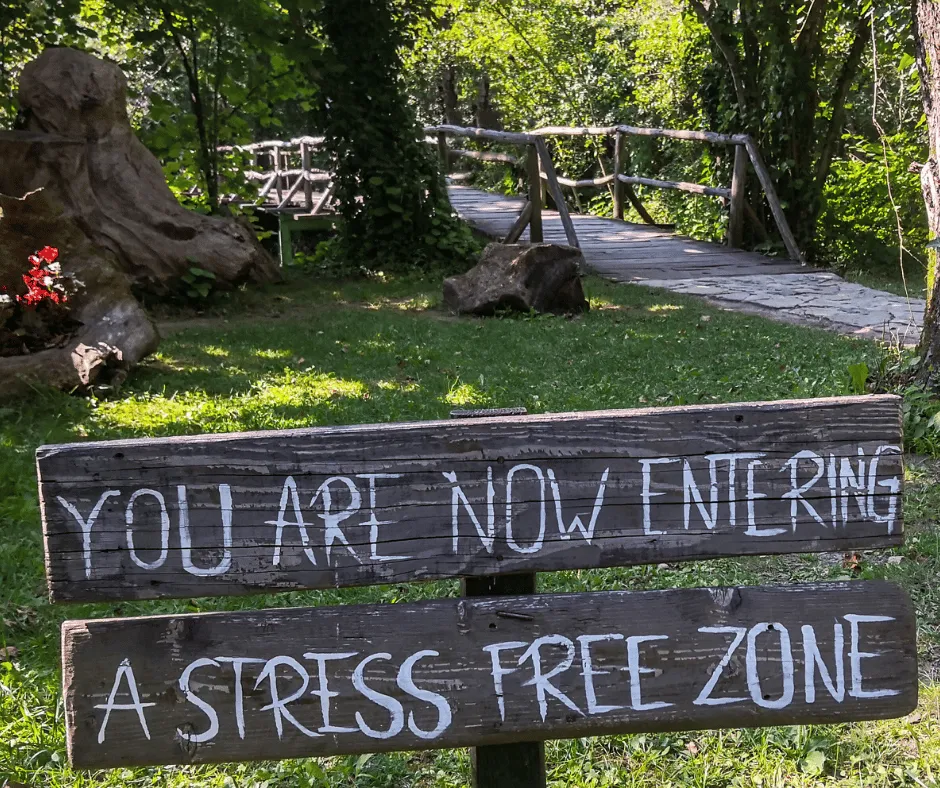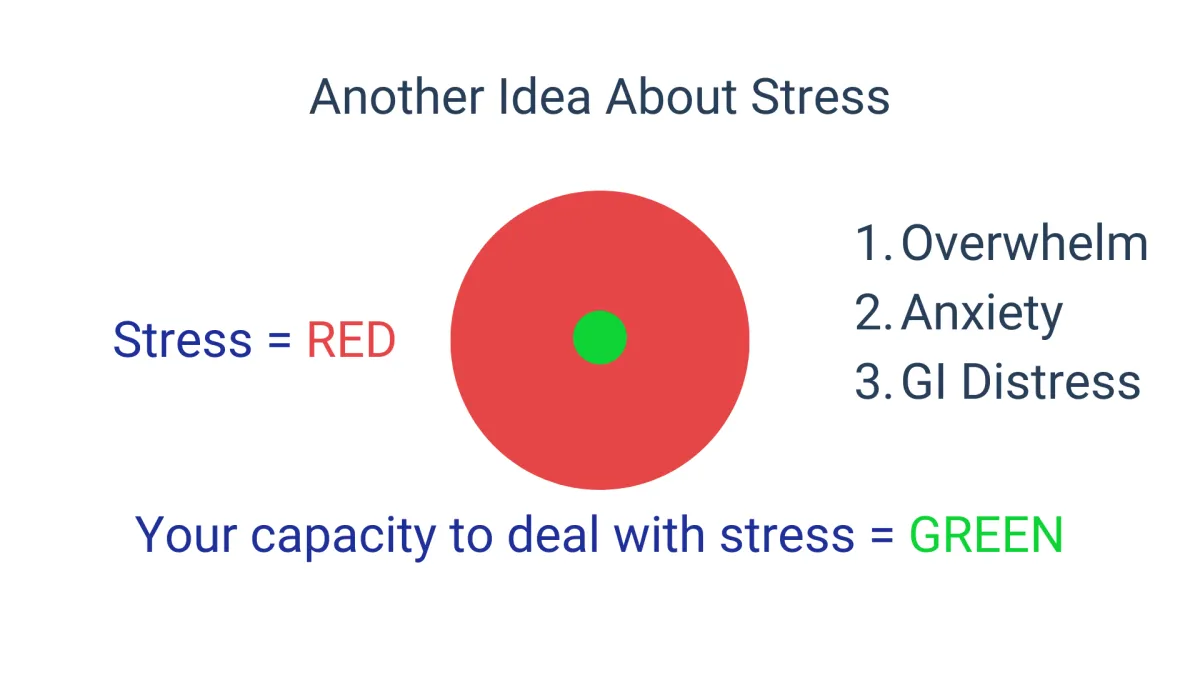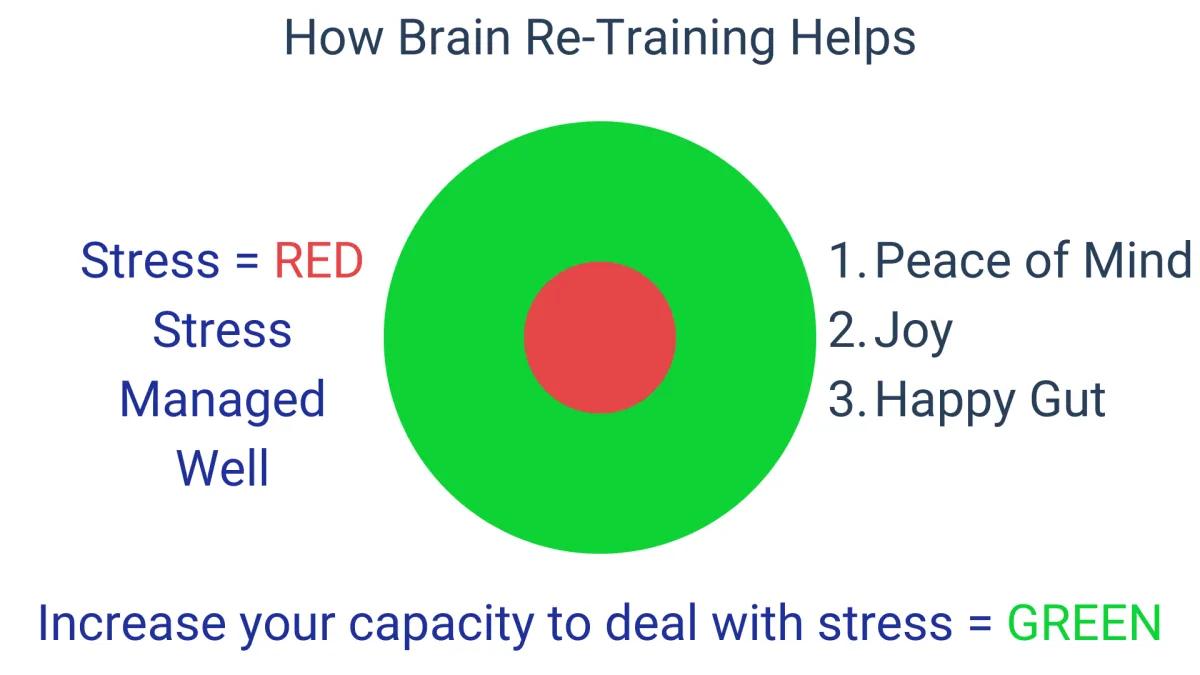
Re-Train Your Brain
Re-Train Your Brain
Stressed and Toxified: Game On! Level Up Your Mindset, Level Up Your Health

Stress is toxic, there . . . I said it.
Sure, it doesn’t take a genius to figure out that stress is a major component of our mental and physical health. The word stress can be a rather broad term as well, so let’s define it here for the purpose of this article.
Excellent, but what are the best ways to deal with it? I’ve had the unfortunate experience of dealing with stress that led to a downward spiral of poor gut health and a multitude of digestive problems . . . it’s not fun. I wouldn’t wish that on anyone. In fact, it’s why I developed a protocol entirely devoted to dealing with it. It’s now been 7+ years since that time for me and I no longer deal with the symptoms thankfully, but I want to be able to use that experience and my expertise to help YOU!
In this article we are going to dive a little deeper into stress management. I want to highlight some proven strategies that will help you increase your capacity to deal with stress. I’m not going to lie, this takes time and effort. But man it is worth it when you figure it out, and you are able to put these principles into practice.
What are the facts?! First, let’s take a look at the evidence and see why this is such an important topic when it comes to gut health and reversing chronic illness.
This research article concludes:
And it gets worse…
Another research article found that heightened inflammation due to stress or depression triggers dysbiosis (imbalance of the microbiome) and leaky gut.
Yet another article links dysbiosis and increased gut permeability (leaky gut) to increased risk of heart disease, obesity, diabetes, and stroke.
I could go on and on, because there have been numerous studies done at this point that show how stress has a negative impact on health in many different ways. Gut health in particular, is tremendously affected, which leads to the development of advanced disease in many cases. In large part, this is due to inflammation that causes increased gut permeability or “leaky gut”. Leaky gut has also been shown to be a major contributor in the development of autoimmune conditions.
When you are experiencing elevated stress levels, through corticotropin releasing factor (CRF) your body will experience significant changes to gut function. The hormone CRF also influences the hypothalamic pituitary axis (HPA), which is responsible for the eventual release of cortisol (the main stress hormone) by your adrenal glands. These signaling molecules can have a fairly sudden and significant impact on things like gut motility, regulation of inflammation, and perceived pain to name a few. It is incredible how interconnected our bodies really are and how much research even in the last two decades has been able to shed more light on the gut-brain axis.
There you have it, the gut-brain connection is real and stress can be a major player in gut health as well as other disease processes. In fact, if you don’t have some good stress management techniques, it may not matter how great your diet is, because stress will cripple your gut’s ability to function well and heal fully.
Still not convinced? Fine, how about a few more key points about stress:
It weakens your immune system
Can make you hungry and crave more sugar (or other bad “comfort food”)
Causes hormone imbalances
Leads to depression and anxiety
Raises your blood sugar
Limits your ability to burn fat
I hope this begins to help you understand just how important it is to get your stress under control.
Decoding Your Stress Tolerance: Zen Master or Getting Thrashed In The Waves?

Stress can be a difficult concept. Some people deal with it like a zen master, while others feel like they are getting pummeled while being driven under the water.
I want to re-frame it for you and see if it will allow you to start thinking about it in a different way. Often, you may try very hard to eliminate stressors in your life all together.
When possible, that’s a great way to reduce stress. However, when it’s not possible, then what? It’s not always easy to get a new job and reduce financial stress, or move out of a stressful environment, and it’s really difficult to recognize and eliminate toxic relationships. We need a way of dealing with stressors that are going to be a part of everyday life without it leading to a mental breakdown or the breakdown of our physical health.

The picture above shows what can happen when our capacity to deal with stress (in green) is smaller than the sum of all the stressors (in red) we have in our lives. It leads to overwhelm, anxiety, and often a lot of negative affects on our physical well-being.
But what if we could increase our capacity to deal with stress? Better yet, what if we could increase our capacity to deal with stress while simultaneously reducing or even eliminating a few stressors along the way. That’s where the real magic happens and we end up with an image like the one below…

The ability to increase your capacity to deal with stress while eliminating or reducing stressors along the way is what gets you to a point where you experience peace of mind, joy, and better health. Stress management truly needs to be a part of every lifestyle program or functional medicine protocol, because it is so important to our overall well being.
Let’s explore some proven strategies that will help increase your capacity to deal with stress. It’s important to keep in mind that we are all unique and will naturally gravitate toward certain ones. Also, you may flat out just not like doing some of them. You should work to discover the strategies that resonate with you, because you are more likely to do them. That being said, you might discover some new ones you end up really enjoying, so don’t knock it ‘til you try it applies here.
We are going to start with the basics, because, you know, they’re important. I’m not going to spend a lot of time on these, but they are definitely worth noting.
Exercise, be more active, go outside!
Yep, it helps, and I’ll keep this section short and to the point. Find something that you like to do, or else you won’t do it. You don’t have to start at an hour, or for that matter, jump into an Arnold Schwarzenegger type workout from the get go. In fact, that would be a terrible idea!
The important thing early on is to make it a habit. Plan for as little as 15-20 minutes to start and do it for 4 days a week. Keep it simple, try different things until you find something you enjoy, and start! It’s important to start. Lots of people plan and miss the starting part, you’ve got to start.
Spending time relaxing outside is also great for stress. Find a place you love to hangout, grab a good book, and relax.
Eat Healthy
As mentioned earlier, diets that cause inflammation create a lot of problems. Do your best to eat a wide variety of healthy whole foods, and avoid foods that are toxic. If you would like more information on this topic, see my article on reducing toxic burden.
The bottom line is, skip the junk food, and get into better habits with your diet. It does have an impact on your stress levels, stress hormones, and will help you feel less anxious and depressed.
Here are a few more to keep in mind:
Make sure to get good sleep
Reduce your screen time
Laugh more
Learn how to say “no” to things (it’s a word, my wife doesn’t use it much, we end up doing a lot more sometimes than we should)
Try yoga
Play some music
Those are all great and you can benefit a lot from those techniques, but when someone is experiencing a chronic stress response that is keeping their body in fight or flight mode, we need to go a little deeper.
For that, we need to talk about one of the brain's most amazing abilities!
Neuroplasticity
Neuroplasticity is essentially the ability of the brain to form new connections in response to stimulation. If the stimulation is negative, the connection formed will be negative.
Think about it this way. When you get food poisoning, a lot of the time you don’t want to have anything to do with that food for a while. You may not want to go back to that restaurant, or even cooking the same food at home will make you start to feel nauseous. Sometimes it can even turn into a developed food sensitivity that never goes away. That type of response to food can also happen with an argument, a bad breakup, or any other strong emotion you experience at the time of eating a specific food and forming that connection!
In terms of neuroplasticity . . . what is fired together, is wired together.
The good news is, the reverse is also true for positive associations and forming new healthy connections.
In fact:
The brain is awesome! That’s where these next few concepts come into play. In my experience, these are some of the best tools when restoring a healthy gut-brain connection and reducing chronic stress. In practice, I have used a combination of different methods depending on the individual and the result we are looking to achieve. We pay careful attention to healing the limbic system, vagal nerve toning, and functional neurology. Today, we are going to discuss another widely researched topic that I often recommend in practice. Mindfulness and Meditation.
Practice Mindfulness and Meditation for Stress Reduction

This one I had a hard time adopting, personally. It wasn’t something that I really looked forward to and the idea of sitting around with my legs crossed saying “ooohmmmmmmm” over and over wasn’t my idea of getting my health back. Turns out, there is a lot more to it than that!
It’s awesome that taking care of your mental health and talking about it, is much more widely accepted than it used to be. And for anyone out there that doesn't like the idea of talking about meditation or mental health, you can always call your guided meditation app your “performance coach”, “wellness coach”, or “peak optimal wellness personal strategist”, you know something more cool like that. I’m going to go ahead and ask that you just give yourself permission to start talking about mental health though, because it’s important and having an accountability partner (someone to talk to) can be huge with making progress.
Here are just some of the benefits of mindfulness and meditation:
Stress reduction (you knew that was coming)
Helps to reduce anxiety and depression
Improves gut health and GI upset
Better sleep
Improved focus and concentration
Improved relationships
Lower blood pressure
Reduction in chronic pain
Boost to the immune system (via improved gut health)
Enhanced feeling of overall well being
There are an incredible number of benefits, so why not give it a shot? That list doesn’t even cover them all.
Here are some great ways to start practicing mindfulness and meditation.
1. Keep A Gratitude Journal
Starting your day out with gratitude is a great way to set the tone of the day. Begin with writing down 5 things you are grateful for at the beginning of the day. Don’t over complicate it.
2. Meditate
When starting out, like many things, it’s going to be easier to meditate with a coach. I really like the headspace app. It gives a free trial option and lets you get a feel for guided meditation. Meditation is not just about sitting around and saying “ohm”. Although, that does stimulate your vagus nerve, so go for it! Meditation is about much more, but one of the most important things is the idea of having more control over your thoughts. Being able to stop the negative thoughts that seem to continually loop through your mind on a bad day is an important skill to learn. You will also learn things like the body scan, noting, and how to empty your mind in order to relax more quickly and get better sleep. It’s great, you should try it.
3. Dial Down Your Overthinking
Dial down your overthinking. We’ve all been there, a thought seems to relentlessly pursue us when there is seemingly nothing we can do about it. Here’s my list of how I tone that down, feel free to borrow these or create your own. The important thing is to find something that works for you to get out of that negative mindset:
Go for a run
Workout
Build legos
Build hot wheels tracks (thank you son!)
Read
Do yoga or stretch
Walk the dog or spend time with other pets
Go for a drive
Make lists – anything will do
Ask a friend what they do to wind down and borrow theirs!
A few more techniques that I know have worked really well for my patients are breathing exercises and the tapping solution (found by clicking here). Again, it’s important to find what works for you, which is why there are lots of different options. I hope by now you are feeling empowered and optimistic! It is absolutely possible to increase your capacity to deal with stress.
You've learned some killer moves to build your stress-busting muscles: exercise, healthy eats, saying "no" more often than your overly-enthusiastic neighbor (or my wife, sorry babe), and maybe even dipping your toes into the mindfulness pool (no weird chanting required, unless you want to, no judgment here).
Plus, we unlocked the brain's secret weapon: neuroplasticity, that mind-blowing (pun intended) ability that lets you forge new healthy connections and leave the negative thought loops in the dust.
Remember, this road to recovery isn’t a sprint, it’s a marathon. Your health journey is your own, so take your time and be consistent, that is the key to achieving optimal health both mentally and physically while providing lasting results. So, get after it and become the mental powerhouse you were born to be!

